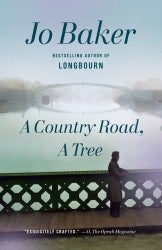Reading Group Center
- Home •
-
Books by Category •
- Imprints •
- Authors •
- News •
- Videos •
- Media Center •
- Reading Group Center
Newsletter
Sign up for the Reading Group Center Newsletter
Reading Group Resources
Reading Group Guides
Reading Group Tips
News & Features
Connect with Us
One Book, One Community
Community-based reading initiatives are a growing trend across the country, and we're pleased to support these programs with a wide range of resources.
Daydreaming and Other Writing Tips from Jo Baker
Jo Baker is a literary force to be reckoned with. She’s written six novels that tackle a variety of topics—love, war, and family, among others—with her beautiful prose and sharp characters. In Longbourn, she retold a favorite tale, Pride and Prejudice, from the perspective of the servants. In A Country Road, A Tree Baker again transports us using a person we know—this time, Samuel Beckett—and brings us to the front lines of his wartime experiences. Told with great detail, emotion, and intrigue, Baker shows us the struggles Beckett faced and how he managed to turn his experiences into timeless art.
Here we’ve asked Jo to share some of the best lessons she’s learned through her years as a writer. We were so glad to have the chance to peek behind the curtain and find out what this great writer thinks is most important. We hope you find her suggestions as helpful as we did.
Writing is really just an intense kind of daydreaming. Instead of letting the thoughts and images and feelings of daydreams naturally drift away, you grab a bunch of words and do your best to pin your daydreams to the page with them. It follows that daydreaming is an important part of any writer’s life. Or wool-gathering, gawping, mooning-about, loafing, whatever your Mum wants to call it—it’s the kind of thing that elicits suggestions about activities you might engage in, and reminders about homework or chores; you get told to “make yourself useful.” But what non-writerly folk often don’t realize is that daydreaming is useful. In fact, it’s vital. You have to give yourself time to be idle; you have to allow for it. Away from school and social media and all the clutter and business of life. The idling brain has an extraordinary way of generating wonders. Let that happen.
Writing is also really just an intense form of reading. It’s all the same process. When you write, you’re in charge of the mustering up of images and marshaling them in order, the pinning down. When you read, you’re pulling out those pins and allowing that other person’s daydreams off the page to flutter around inside your own brain. Every reader brings a different range of experience and understanding to the process, but still, in each instance, it’s an act of collaboration, and, I think, quite magical. It follows that reading is a vital and instinctive part of any writer’s life. A good writer will want to know the process inside out, to collaborate on it in both directions. So my advice to anyone who wants to write, is to read. Read widely, read weirdly, read well. Reread what you already love, but also read outside your comfort zone, the stuff that challenges you, read immortal prose and disposable bumf. Read the newspaper and the back of cereal packets and science journals and history and Literature with a capital L and popular fiction and really whatever you can get your hands on. Read for pleasure and for information and to see how the other person’s done what they have done, whether it’s done badly or well.
Writing is also just really rewriting. The rest of this piece is my opinion, but this, this is a fact. First drafts aren’t great. And even if they are (they never are) they can always stand improvement. But you know what? Don’t be downhearted. This is how it works. First drafts aren’t great because they are first drafts. It’s fine if there are a few plot holes and spelling mistakes and placeholders and facts you haven’t checked yet. That means you wrote it with an energy and focus that didn’t allow for forty-five minutes on Google figuring out what they used for deodorant in the 1920s or what that other word was for “henchmen” (not “lackeys” or “minions,” the other one, begins with “a”). The magical thing about first drafts, once you’ve got one of them, is that you get to write a second. And a third. That’s your job. Now on you go, get on with it. And best of luck.


